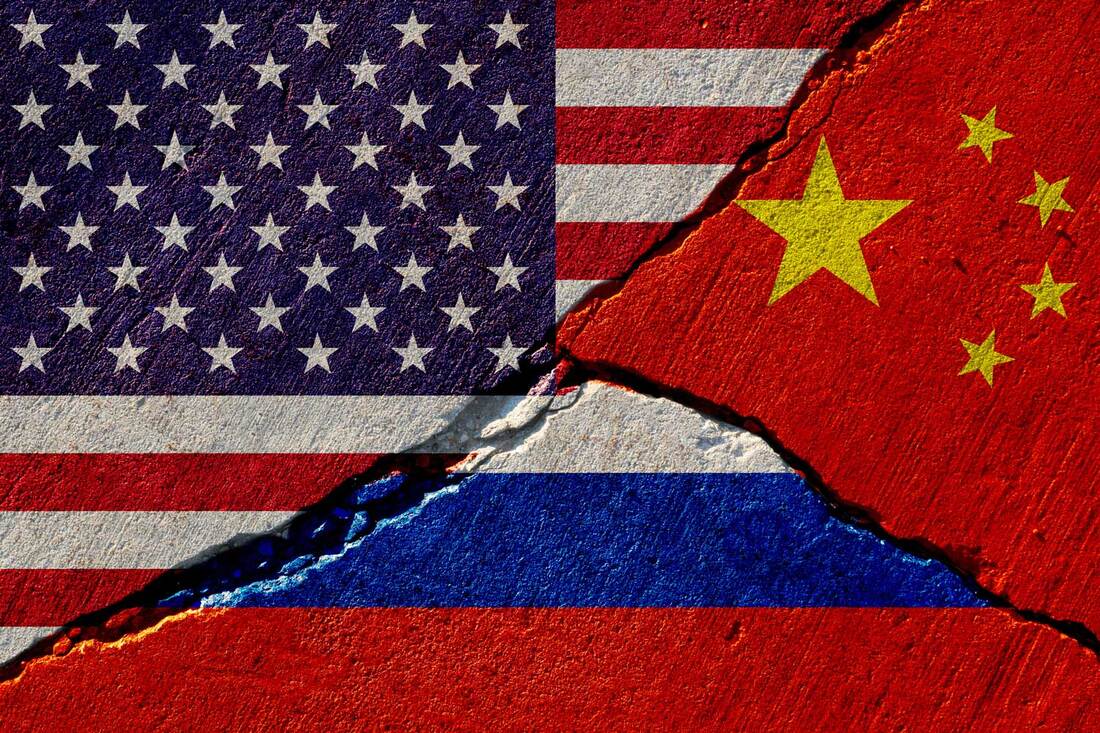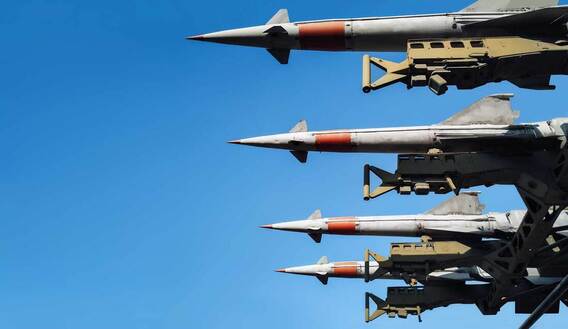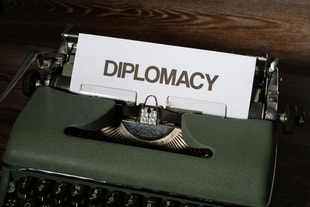|
DR. Christopher Zambakari, B.S., MBA, MIS, LP.D., PHF Founder & CEO, The Zambakari Advisory Hartley B. and Ruth B. Barker Endowed Rotary Peace Fellow Assistant Editor, Bulletin of The Sudan Studies Association  Credit: Nikolett Meresz Credit: Nikolett Meresz In our Spring 2023 Special Issue: “The Great Power Competition in Eurasia,” we invited experts, including Ambassador Charles W. Freeman Jr., to analyze the historical context of the Ukraine conflict. We examine the role of the U.S.-led NATO alliance, China's emergence, and more. Freeman, a former U.S. assistant secretary of defense and diplomat, warns against military-centric diplomacy. His Q&A, 'Ukraine, China, and the Global Failure of US Policy,' explores nuclear risks and the need for global partnership. Freeman fears the worst, if the U.S. doesn’t turn its focus away from military prowess and territorialism and, instead, concentrate on being a better world partner.
0 Comments
DR. Christopher Zambakari, B.S., MBA, MIS, LP.D., PHF Founder & CEO, The Zambakari Advisory Hartley B. and Ruth B. Barker Endowed Rotary Peace Fellow Assistant Editor, Bulletin of The Sudan Studies Association  Credit: UNIKYLUCKK/Stutterstock Credit: UNIKYLUCKK/Stutterstock In our Spring 2023 Special Issue: “The Great Power Competition in Eurasia,” we invited experts, including Ambassador Charles W. Freeman Jr., to analyze the historical context of the Ukraine conflict. We examine the role of the U.S.-led NATO alliance, China's emergence, and more. Freeman, a former U.S. assistant secretary of defense and diplomat, warns against military-centric diplomacy. His Q&A, 'Ukraine, China, and the Global Failure of US Policy,' explores nuclear risks and the need for global partnership. Freeman fears the worst, if the U.S. doesn’t turn its focus away from military prowess and territorialism and, instead, concentrate on being a better world partner. DR. Christopher Zambakari, B.S., MBA, MIS, LP.D., PHF Founder & CEO, The Zambakari Advisory Hartley B. and Ruth B. Barker Endowed Rotary Peace Fellow Assistant Editor, Bulletin of The Sudan Studies Association  Credit: Beautiful landscape/Shutterstock Credit: Beautiful landscape/Shutterstock In our Spring 2023 Special Issue: “The Great Power Competition in Eurasia,” we invited experts, including Ambassador Charles W. Freeman Jr., to analyze the historical context of the Ukraine conflict. We examine the role of the U.S.-led NATO alliance, China's emergence, and more. Freeman, a former U.S. assistant secretary of defense and diplomat, warns against military-centric diplomacy. His Q&A, 'Ukraine, China, and the Global Failure of US Policy,' explores nuclear risks and the need for global partnership. Freeman fears the worst, if the U.S. doesn’t turn its focus away from military prowess and territorialism and, instead, concentrate on being a better world partner. DR. Christopher Zambakari, B.S., MBA, MIS, LP.D., PHF Founder & CEO, The Zambakari Advisory Hartley B. and Ruth B. Barker Endowed Rotary Peace Fellow Assistant Editor, Bulletin of The Sudan Studies Association  Credit: Victority/Shutterstock Credit: Victority/Shutterstock In our Spring 2023 Special Issue: “The Great Power Competition in Eurasia,” we invited experts, including Ambassador Charles W. Freeman Jr., to analyze the historical context of the Ukraine conflict. We examine the role of the U.S.-led NATO alliance, China's emergence, and more. Freeman, a former U.S. assistant secretary of defense and diplomat, warns against military-centric diplomacy. His Q&A, 'Ukraine, China, and the Global Failure of US Policy,' explores nuclear risks and the need for global partnership. Freeman fears the worst, if the U.S. doesn’t turn its focus away from military prowess and territorialism and, instead, concentrate on being a better world partner. May 10, 2023 Dr. Christopher Zambakari Founder & CEO, The Zambakari Advisory Hartley B. and Ruth B. Barker Endowed Rotary Peace Fellow Assistant Editor, Bulletin of The Sudan Studies Association  Recently, The Zambakari Advisory sat down with Ambassador Freeman in a wide-ranging Zoom call, posing questions on a series of subjects relating to the war in Ukraine, U.S. relations with China, the state of U.S. diplomacy, and the role of Africa and its emerging countries in a world shifting from unipolarity to multipolarity. Considered one of the “whiz kids” of the U.S. State Department when he entered the foreign service in 1965, Chas Freeman Jr. was for nearly 50 years involved in diplomatic service to his country including serving as U.S. Ambassador to Saudi Arabia under President George W. Bush, assistant secretary of defense during the Clinton administration, and interpreter for President Richard Nixon during the path-breaking 1972 China visit. Below are other excerpts from the March interview with Ambassador Freeman. Read the full issue published by Global Policy here! Kaushik Basu, PhD. Former Chief Economist of the World Bank and former Chief Economic Adviser to the Government of India  B.Zhou / Shutterstock.com B.Zhou / Shutterstock.com The biggest risks facing the world economy today stem from the escalating trade war between the United States and China. In the past few weeks, the threat has gained greater salience: As negotiations have stalled and tariffs have risen, markets around the world have registered tremors of concern. Yet most commentators fail to recognize the kind of effect an all-out clash would have on the U.S. economy, and on the world. Shawn Fremstad Senior Policy Fellow at the Center for Economic Policy and Research  If you listen to Social Security’s critics, it’s easy to come away thinking that Social Security is a system of generational theft in which Boomer parents and grandparents steal from their children and grandchildren. At the same time, many of these same critics point to the Temporary Assistance for Needy Families (TANF) block grant as a model social program for families. Yet, Social Security does much more to help kids today than TANF. Although Social Security is typically thought of as a retirement program, minor children are eligible for direct benefits if one of their parents is an insured worker who has retired, become disabled, or died. In 2018, nearly 3 million children under age 18 received $20.9 billion in Social Security benefits. The number of children receiving Social Security has been relatively stable in recent decades. For example, in 2000, roughly 3 million children received benefits. Dean Baker Senior Economist at The Center for Economic and Policy Research (CEPR)  Editorial Credit: Chinese 100 Renminbi and 100 U.S. dollar bills: Dan Hanscom Photography / Shutterstock.com Editorial Credit: Chinese 100 Renminbi and 100 U.S. dollar bills: Dan Hanscom Photography / Shutterstock.com For most people, the country’s national debt and annual deficit are not major concerns. However, for a substantial portion of the policy types who make, write, and talk about economic and budget policy, debt and deficits are really big deals. And, the fact that our budget deficit and debt are both large by historic standards, and growing rapidly, is an especially big deal. The list of people in this category is lengthy. It starts with the Peter J. Peterson Foundation (which displays the debt in big numbers right on its home page) and the many groups funded by them. The most important is the Committee for a Responsible Federal Budget, which is virtually guaranteed prominent placement in stories on the budget by major news outlets. Dean Baker Senior Economist at The Center for Economic and Policy Research (CEPR)  January 19, 2019 San Francisco / CA / USA - Participant to the Women's March event holds "Medicare for all" sign while marching on Market street in downtown San Francisco. Editorial credit: Sundry Photography / Shutterstock.com January 19, 2019 San Francisco / CA / USA - Participant to the Women's March event holds "Medicare for all" sign while marching on Market street in downtown San Francisco. Editorial credit: Sundry Photography / Shutterstock.com The push for universal Medicare was given new momentum by Bernie Sanders campaign for the 2016 Democratic nomination. While it is still quite far from becoming law in even an optimistic scenario, it is certainly now treated as a serious political position. This is probably best demonstrated by the fact that the Medicare for All (M4A) bill put forward by Washington representative Pramila Jayapal has 107 co-sponsors, nearly half of the Democratic caucus in the House. As much progress as M4A has made, it will still be a huge lift to get it implemented. A universal Medicare system would mean shifting somewhere around 8 percent of GDP ($1.6 trillion at 2019 levels) from the private system to a government-managed system. It would also mean reorganizing the Medicaid program and other government-run health care programs, as well as the Medicare program itself. The current system has large co-pays and many gaps in coverage, such as dental care, that most proponents of M4A would like to fill. It also has a large role for private insurers in the Medicare Advantage program, as well as the Part D prescription drug benefit. Graham E. Fuller Former Senior CIA Official and former Vice Chairman of the National Intelligence Council at the CIA in charge of long-range strategic forecasting; Adjunct Professor of history at Simon Fraser University in Vancouver.  Illustration of a nuclear bomb explosion. (Credit: Flowgraph). Illustration of a nuclear bomb explosion. (Credit: Flowgraph). Membership in the nuclear club is jealously guarded. The fewer the members the better. And the latest member to work his way in the door invariably calls for the gates now to be locked behind him; no new members after me. There are good reasons for this. One is the world perceives that the less nukes around, the better; they are less likely to get used and surely that’s good for everybody. But the more realistic reason for keeping the club tiny is that no nuclear state wants to yield up any more power to any other ambitious states in the world than absolutely necessary, to preserve their own monopoly. And there is a theological issue among strategists about whether states going nuclear makes it more, or less likely that war will break out between them. So far, at least, that seems to be the case, even between the unstable nuclear states of Pakistan and India. But who knows what the future will bring? |
Be our guest.
Interested in being featured on our blog? We'd love to hear from you. Find out more. ARCHIVES
May 2023
CATEGORIES |
Copyright © 2023 The Zambakari Advisory - Privacy Policy
Our site uses cookies to improve your experience. You can control cookies by adjusting your browser or device settings.
If you continue without changing your settings, we assume that you are happy to receive all cookies.
If not, please feel free to opt out here.
SEO by Qasim Khilji
Our site uses cookies to improve your experience. You can control cookies by adjusting your browser or device settings.
If you continue without changing your settings, we assume that you are happy to receive all cookies.
If not, please feel free to opt out here.
SEO by Qasim Khilji
